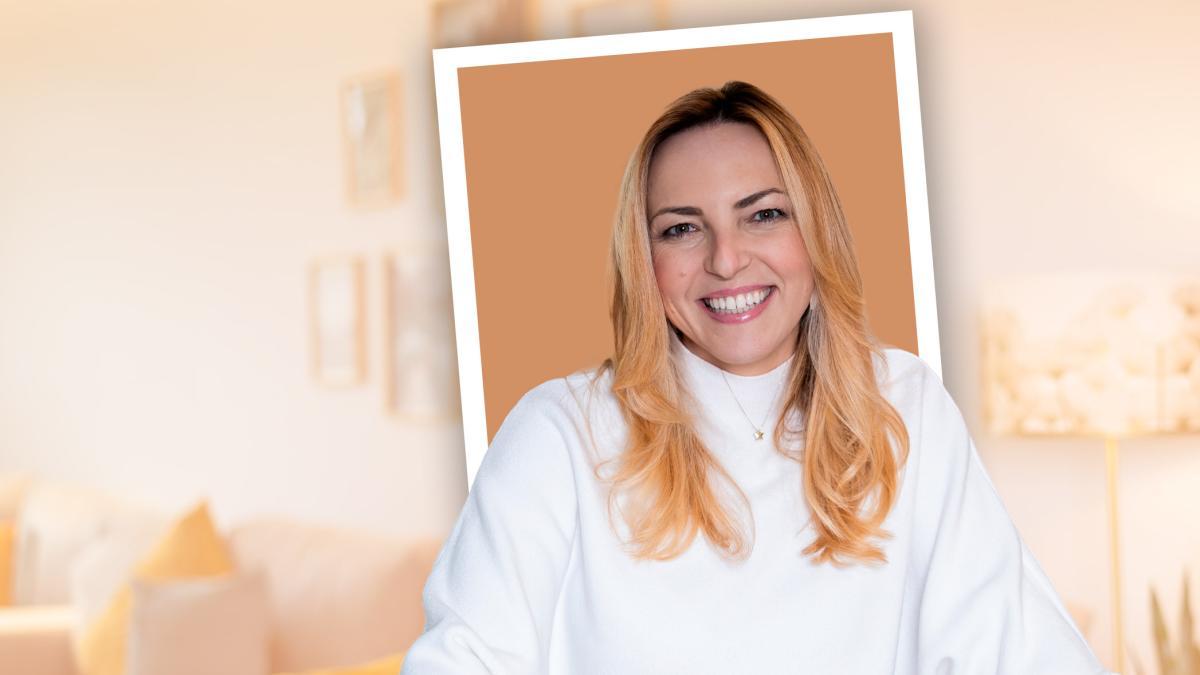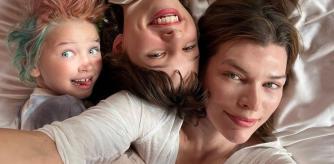
Lucía Galán Bertrand has lively blue eyes, the complexion of an English lady and a facility for communicating that has made her a popular phenomenon. This pediatrician, who practices in her practice in Alicante, has published several books (headed by best-seller Lucía’s great book, My Pediatrician), has more than a million followers on social networks and her blog is a reference in children’s health.
The interview with The vanguard It is based on his latest work: Viruses do not enter through the feet (Planet), where he debunks myths about the physical and mental health of children and families. Ideas so established in the psyche of mothers such as: “If you go barefoot, you will catch a cold” or the sprig of geranium as a home remedy against baby constipation (something completely discouraged). Other myths are newer and more harmful, starting with hoaxes about vaccines or what the author calls “poison darts,” which are especially thrown at mothers.
The myths that come from the networks are more dangerous because they are masked under dark profiles that want to sell you products
He has more than a million followers on Instagram alone: Did you need to write another book?
Always! I am very restless intellectually and I need to create new things. This book, Viruses do not enter through the feet, came from the need to dismantle in black and white all these myths, those urban legends, that have been circulating for decades and that I have heard both as a mother and in consultation. The Internet is a reference that we all turn to, but people still trust books a lot. Furthermore, it is not so easy to search for information on social networks: I have more than five thousand posts on Instagram but, if you go to look for the one about “sudden exatema”, which I published more than five years ago, you will not find it, while in the book , you just have to go to the index.
It has become a phenomenon on the internet: Where do you find the time to manage your networks?
I started on Instagram ten years ago and have been learning a little as I go. The growth has been gradual, natural… How do I manage it? Well, in a way, I improvise the contents: if I go to the doctor’s office and I hear on the radio that there is an outbreak of whooping cough, when I arrive, I give an update on whooping cough. If a patient fails me and I have just seen scarlet fever, then I make a video telling what I have told the mother. The networks don’t stress me, nor do the comments: I answer them in my free time. My goal is to bring complex topics about their children’s health to the public and reassure families.
And this book is a new step, reassuring against the false beliefs that exist around parenting. Where are these myths created more: in the popular heritage or on networks?
Popular beliefs are deeply rooted; They have been passed down from generation to generation. But they are the usual ones: “Put on your slippers, you’re going to catch a cold,” “the sprig of geranium,” etc. But on networks, these myths are often masked under dark, pseudoscientific profiles that want to sell you products or training. There is a certain evil. There you find that the message is much more manipulated. So the myths that come from the networks are more dangerous, because in the others, the popular ones, there is no evil.
If you go barefoot and your throat hurts, that is coincidence, not causality. Walking barefoot does not lower your defenses
In the book he dismantles a long string of myths but: What would be the three most important?
One of the most present, against which we continue to fight and which has also generated hundreds of child deaths, is the one that emerged from a fraudulent study that linked the triple viral vaccine (measles, rubella and mumps) with the appearance of spectrum disorder. autistic. And although there are more than a million children studied (compared to eleven in the original study!), although all the committees and scientific organizations, national and international, have collapsed it, we continue to suffer the consequences of this misinformation. And the most affected are children, who have no decision-making capacity or room for maneuver once the disease is established.
The second myth?
It is also linked to serious health consequences for children and is the idea that “it is okay” to have a glass of wine or a beer during pregnancy. But alcohol consumption during pregnancy is the most common preventable cause of cognitive disorders and intellectual disability. There is no safe minimum amount of alcohol during pregnancy, because it is a highly toxic substance.
And the third is… the tacataca, the walker: a gadget that multiplies the risk of childhood accidents by three (the data makes your hair stand on end!), and is prohibited in several countries. The best tacataca is the one that is not used!
She also mentions the almost atavistic fear of so many Latin mothers that their children will go barefoot and catch a cold. Convince us that this is not the case.
Let’s see… Viruses don’t enter through the feet! They enter through direct person-to-person contact. They are spread through the droplets of saliva that we produce when coughing, when talking… Not by going barefoot. If you go barefoot and your throat hurts, that is coincidence, not causality. Walking barefoot does not make your throat hurt or lower your defenses. What causes the disease is the virus, not the low temperature. There is no such thing as cold, but rather inadequate clothing.
There is no right for mothers to fall into depression due to other people’s judgments about whether they breastfeed their children or not… And we have full consultations!
In her book she talks about breastfeeding and dismantles some of the myths that surround it. No one doubts its benefits, but today it is striking that it is becoming the “only” valid way to feed the baby, which is also a myth. Do you detect this trend?
Already in my first book, The best of our lives, I asked that the judgments towards the type of food we give our children stop. I am a pediatrician and, of course, I promote breastfeeding: I breastfed my children for a year and it was a very rewarding experience, but I also see every day women devastated by other people’s comments, guilt and the feeling of being bad mothers for not having been able to breastfeed or having decided – for whatever reasons – not to breastfeed. Our mission as pediatricians is to advise and support. And at the moment in which mothers make the decision, we are not judges, but we have to continue supporting them, explaining to them that there are other options to feed their children, that they are not worse mothers for it and, of course, that they are not. ‘poisoning’…
I remember a mother who told me that when she gave her daughter her first bottle, she felt like she was giving her bleach.
This thought comes from the opinions and judgments you receive. Here I do see that, with social networks, the message has become very radicalized in some sectors. And I emphasize the “some”, because there are many health professionals who say, enough judging! What’s more, now there is less and less talk about extolling the benefits of breastfeeding: we all know that it is the best food but, sometimes , praising it in a very aggressive way is generating great guilt for those who have not had that option. There is no right for mothers to fall into depression because of this and there are many, we have full consultations. The postpartum period is difficult to have to listen to other people’s judgments. We should all stop this.
He goes, almost on tiptoe, through the theme of childhood dreams. We really have to go two years without sleep, like what happened to you?
I’m going on tiptoe because I’ve talked so much about sleep in other books that I didn’t want to repeat myself. Do we have to get used to not sleeping? What we have to do is normalize what is a normal, physiological sleep for a child from zero to two years old. We have to understand that a baby, up to six months, wakes up approximately every two hours. Just as you must also be very clear about the factors that promote good sleep. But, of course it is not “a child will not sleep until he is two years old”, because behind sleep problems there can also be pathology. My advice is for parents to educate themselves about what a child’s normal sleep is, what things they can do to facilitate it, and what are the warning signs that make them suspect that there may be something more.
Mantras like “Wanting is power” or “He who follows it gets it” do nothing more than undermine your self-esteem and destabilize you.
On the topic of sleep, another widespread myth is that mothers who followed the Estivill method are practically “abusive”, although there are dozens of studies that show that, well applied, crying suppression methods are not harmful but beneficial for the family. Why has Estivill become a taboo topic?
Something very similar to what happens with breastfeeding is happening here: the message has been very radicalized. There has also been a lot of professional intrusion, there has been a lot of bad talk about sleep and I think that Eduard Estivill has been unfairly judged, because, along with Dr. Gonzalo Pin, he is one of the greatest sleep experts we have. His message has been distorted a little, it has been radicalized. It is also true that when the book was published, not everything was known about dreams that is known now… How easy it is, in retrospect, to judge a work that is already thirty years old! But today many people talk about sleep without knowing and it is an extremely complex topic. Today it seems like everything is co-sleeping [compartir la cama con el hijo] or “Estivill and you are mistreating your child.” One thing or another. Here we also need calm and respect.
The second part of your book is dedicated to the myths around child and adolescent mental health: Which would be the most urgent to address?
Well, ideas like “Bullying is a child’s thing” or “No one has been traumatized by it.” Yes, it has always existed, but there are many adults with significant traumas due to a bullying kept. One in four children in our country suffers from bullying and it is the main cause of suicide among minors. The figures are chilling. It is such an extremely serious issue that we cannot say that “it is their thing.” It is the responsibility of all adults, and children are waiting to see what we do in this area.
It also gives an elegant review of self-help and positive thinking slogans, such as ‘wanting is power’. Because?
Well because they do a lot of damage. One of the things we carry with us in motherhood is guilt, whether from breastfeeding, from managing tantrums, or from adolescence, where you think you are doing terrible. And, on this path, mantras such as: “If you want it, the universe gives it to you”, “Wanting is power” or “He who follows it gets it”, do nothing more than undermine your self-esteem, shake your feelings and They destabilize you.
You call them “poisoned darts”…
Yes, because wanting is not always power: sometimes you want and you can’t, because you don’t have the skills. And be careful with these types of messages with your children because, like us, our children have limitations and it is good for them to be aware of them. How good it is that they are aware of their talents. But those who have, not those that we parents would like them to have: it is not okay to project our aspirations or unresolved traumas on our children. They are not a box that you have to put and put in, but a box to open, to discover what is in it and help them grow in the talents they have there.


